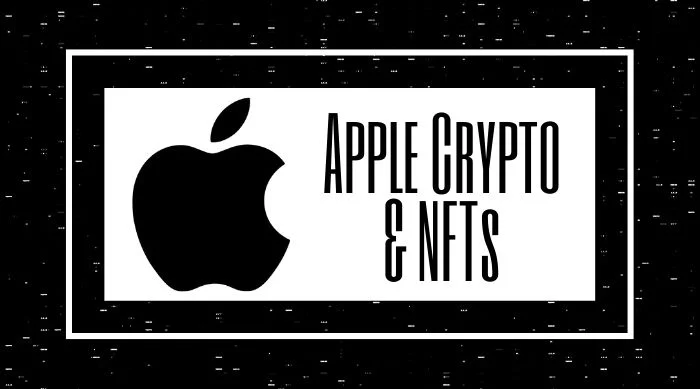Is there such a thing as Apple cryptocurrency or Apple NFTs? The company’s CEO Tim Cook is quoted in a November 2021 interview saying there is “interest” but that there are no immediate plans to “go crypto”, or begin accepting cryptocurrency payments. Here’s what to know about Apple and cryptocurrency.
Apple CEO Tim Cook On Apple Crypto And NFTs
Tim Cook was asked about launching crypto products in 2021, and his reply was telling. Apple might have a list of things NOT to do, though, however informal.
Cook went on the record saying he didn’t believe the typical Apple shareholder bought in to get “exposure” to cryptocurrency. That notion informs his stated decision not to invest any portion of Apple’s “cash balance” in cryptocurrency.

Coming from the CEO of the company, that should provide an obvious indicator of the level of caution Apple is taking in this arena. Cook adds more caution when pushed about accepting crypto via Apple Pay or elsewhere. In response, he says the issue is something being “looked at”.
What could get Cook to take crypto more seriously? Most likely, the competition. TechCrunch reports that Apple Pay rivals Venmo, Square, and PayPal have all moved into cryptocurrency one way or another. Will Apple really be the only holdout?
Is Apple Against Cryptocurrency?
A quick look in the Apple App Store reveals that NFT and crypto-based apps aren’t banned there. But controversy or two related to App Store policies reveal that Apple is taking a very ala carte approach to the types of crypto apps it allows in the store. Ala carte as in, some features may be banned, and others may not.
Coinbase Chief Executive Brian Armstrong went on record complaining about these policies, more or less accusing the company of potential antitrust violations for its ban on certain applications.
And then there’s Apple’s ban on an app called Sticky, which was made available in the Apple Store for a few months before being taken down for “misleading” terminology in the app’s description.
What was so misleading that it forced Apple to yank the app? The company’s chief complaint seems to be that the term “NFT” as used in the app description also included projects that were not minted and stored on a public blockchain. Sticky included a feature that let users mint an NFT to the Sticky blockchain to be bought and sold within Sticky.
That likely contributed to Apple’s decision to pull the app but part of the controversy here is the claim that Apple did not give the developers any time to address the complaint, the app was simply pulled.
App Store NFT Options
The Apple App Store does include certain NFT-related options. Between the issues mentioned above and what we discuss below, it may be possible to get a better understanding of Apple’s approach to crypto.
For example, OpenSea.io has an app in the App Store. By the very nature of OpenSea, you would assume this app is meant to facilitate the buying and selling of NFTs. But the app is described as a tool for browsing NFT galleries, and not for purchasing.
A similar app by Rarible offers the same service; a means to view NFT artwork on a mobile device. Apparently, it can be tough to develop an NFT or crypto-related app acceptable in view of App Store policies because specific guidance on crypto isn’t very clear. And staying in compliance with murky regulation leads to all sorts of inconsistent or define-the-rules-as-you-go enforcement.
There may be no better example of this than the Sticky app issue discussed earlier. Apple permitted the app back after banning it thanks to a few modifications such as allowing NFTs to be exported to a public blockchain. Could the issue have been handled with better communication?
Chances are good the answer to that question is yes, but when a retail giant talks to a comparatively tiny developer, the power dynamic is sometimes the driving force in how such matters are handled.
Back To Tim Cook
Tim Cook went on record in an interview published by TechCrunch saying NFTs do have something to offer but that it may take more time for the crypto ecosystem to evolve to the point where it has interest to the casual user.
Does that sound familiar? It’s the same environment we found ourselves in during the 1990s when mainstream use of the Internet was not what it later became. Who will be the America Online of crypto? That’s an important question, assuming cryptocurrency plays out in a similar manner.
Does Tim Cook hate crypto? Believe it or not, he doesn’t. He has been quoted saying that he personally feels it is “reasonable” to own cryptocurrency as part of a diversified investment strategy. When asked about this he is quick to add that he is not dispensing investment advice.
The key to Cook’s views here is the word “diversified”. Cook is likely of the view that crypto, much like commodities trading, such risky investments have to be a smaller part of a diverse portfolio.
You don’t have to be 100% risk-averse in your strategies, but minimizing the risk to the overall portfolio is a smart move. That too, should not be taken as investment advice but rather as an inspiration to do more research in this area to learn how to protect your investment.
Joe Wallace has covered real estate and financial topics, including crypto and NFTs since 1995. His work has appeared on Veteran.com, The Pentagon Channel, ABC and many print and online publications. Joe is a 13-year veteran of the United States Air Force and a former reporter for Air Force Television News.


